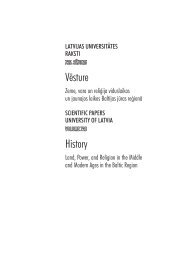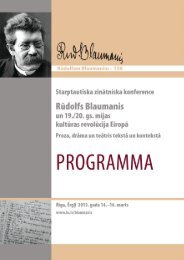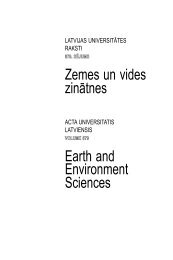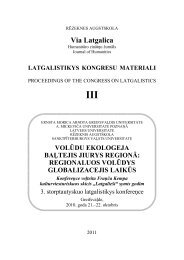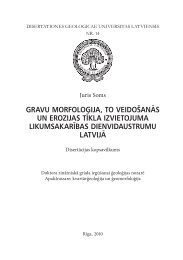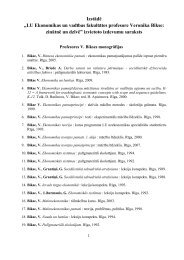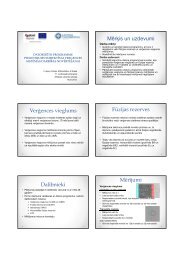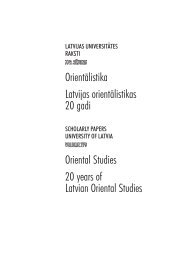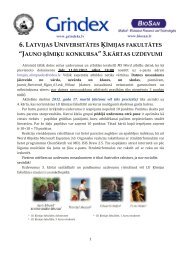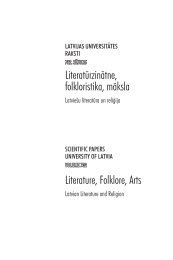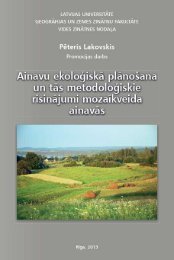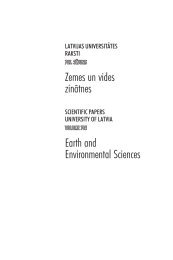Untitled
Untitled
Untitled
Create successful ePaper yourself
Turn your PDF publications into a flip-book with our unique Google optimized e-Paper software.
274 LITERATÛRZINÂTNE, FOLKLORISTIKA, MÂKSLA<br />
Chinese philosophical thought has endured similar ups and downs. The tradition,<br />
largely intact for hundreds of years, was awakened from its hibernation to face<br />
its Other. The identity of its traditional discourse in the course of the last hundred<br />
years has suffered serious blows from outside. The Western sciences and their methodologies,<br />
diverse philosophical theories and ideas have challenged Chinese minds.<br />
The challenge has become even more serious in the face of the post–modern age of<br />
borderless communication.<br />
The third generation New–Confucianism philosopher Cheng Chung–ying has described<br />
it as follows: “Understanding contemporary Chinese philosophy is a philosophical<br />
enterprise that poses a methodological task: we must seek to understand how<br />
Chinese philosophers view and appraise Western philosophical thinking and how<br />
Chinese philosophy has rediscovered itself and defined its own identity.” 1<br />
In the following passages Cheng Chung–ying also defines the task of a modern<br />
Chinese philosopher who is faced with the challenges coming from the Western philosophical<br />
tradition: “There have been two major tasks involved in responding to the<br />
challenge posed by Western philosophy. The first task is to understand and interpret<br />
the old in the new and interpret the traditional in the modern.” 2<br />
“In responding to the West and constructing a new identity, it is necessary to distinguish<br />
between the modern and the Western.”<br />
“We must accept that science and technology can be adopted universally and are<br />
neutral regarding cultural values, but everything beyond science and technology is a<br />
reflection of traditional values or a reaction against them. … the task of contemporary<br />
Chinese philosopher has two aspects: the first is to seek forms of rationality that<br />
conform to science and democracy; the second is to find suitable place and voice for<br />
traditional values.” 3<br />
The core meaning of these passages might be summed up in one simple expression:<br />
the quest for an identity. The ongoing experience of modernity has brought about<br />
the clashes of traditional identity with the expanding otherness, namely the<br />
universalising discourse of Western philosophical systems and previously unknown<br />
categories and preassumptions. The redefining, rethinking and evaluating this clash–<br />
like dialogue with the Western philosophy has occupied the minds of Chinese intellectuals<br />
since the time when the gunshots threatened the very survival of the tradition.<br />
The move by Western powers was supported and legitimised by their own universalistic<br />
assumptions of the role of the Other in their worldviews, which has been<br />
brilliantly shown by Edward Said in his epoch–making Orientalism and in its inner<br />
discourse carried to the extreme.<br />
From the passages quoted above, it is obvious that modern science, originally<br />
being the product of the Western Europe and via which the Other was oftentimes<br />
subdued, due to its universal and formal character of the language it uses to convey<br />
its theories, is no longer a threat, nor even is being perceived as dangerous for the<br />
survival of the tradition. It is the Western paradigm of philosophy, which is in a dialectical,<br />
even antagonistic relationship with the tradition.<br />
Much has been written and said about the possibility and impossibility of the<br />
enterprise to make different cultures intelligible to each other. For the most part the<br />
West had attributed itself the role of the discoverer, had legitimised it by its own



